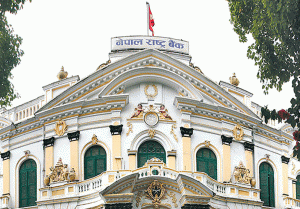
Durgaraj Shrestha, the vice-president of the Federation of Nepalese Chambers of Commerce and Industry’s Bagmati provincial committee, has been doing business in the Nepali market for 30 years. He is a dealer for daily-use beauty products produced by a multinational company, which he sells to grocery stores, supermarkets and wholesalers here.
His customers give him cheques from banks and cooperatives for the goods he sells in the market. Currently, he has some 400 cheques from the cooperatives yet to be cashed. It has been almost a year since they were not cashed.
According to Shrestha, some of the people who took the goods from him have fled, but he has trouble collecting the payments even from those who are doing business. His problem started last year and now the situation has reached its peak. Because he manages a large-size business, he says he had been managing the credits. However, as the problem is growing severely in the Nepali market, the business cycle has deteriorated.
Businesspeople do not want to speak openly about the Nepali market being deteriorated due to credits saying that it can create distrust in the market and cause a crisis in the business. However, they say that the credit crisis has tightened its grip in every sector and it has affected the trust cycle.
Industrialists and businesspeople say that due to unusual credits in the business of agricultural products, small and medium-level industries, and products like food, cement, iron, bricks, and beverages, the industry and business have collapsed. They say that while credit has impacted the domestic market, the new policy of the Nepal Rastra Bank has now discouraged international trade that too is running on credit.
Problem for all
Suman Poudel left his once lucrative job and went into the business of distributing soaps, shampoos, biscuits, noodles and other kinds of stuff required in everyday life in the Patan area. He says that, in a decade, this year is difficult with more than Rs 20 million left to be collected from the market. “I am on the verge of the bank auctioning my property. The day I collect my money, I will leave everything and take another job instead. It is not possible to do business in this country,” he says.
Another businessperson from Kathmandu is currently busy in the legal process of collecting credits. A few days ago, he filed a fraud complaint against a minimarket that closed down. The minimart had taken goods worth Rs 4 million from him. He still has to collect nearly Rs 10 million from the Nepali market.
“There are many credited bills and uncashed cheques. I cannot do my business by just sitting and listening to their problems,” he says, angrily, “Rather than suffering the humiliation alone, I have decided to start the legal process against those who do not pay my credit. My friends told me not to, but now, it has affected my house.”
Another businessperson Om Prakash Bansal says businesses of trading pulses, rice and oil just have credits in the Nepali market. He says that instead of paying the credits, the shopkeepers show the file of customers who are yet to pay their dues instead.
“The market has deteriorated so much that we are in a dilemma of what to say. People have not paid for the food they eat. Our (wholesale shop’s) money is to be paid by the retailer and marts. And their money is to be paid by people,” says Bansal, adding that he is waiting for the business to improve one day.
According to the Nepal Retail Trade Association, small retail shops in the Nepali market are now in a crisis due to consumer behaviour, problems with cooperatives, an increase in investments and large chain businesses.
Dhruv Adhikari, a co-treasurer of the association, says that there is a widespread tendency for consumers who have taken credit to leave their place of residence and run away. According to him, the cost of the goods purchased by the retail shop has doubled and the profit has decreased significantly, so it is not possible to manage the credit.
He claims that many of the 12,000 retail shops in the valley belonging to the association have now gone out of business due to the credit cycle.
According to the Kathmandu District Police Ranage, there has been an increase in complaints related to financial crimes and disputes in the Nepali market the last two years. “The number of crimes such as bounced cheques, cash transactions using illegal documents, and pending payment on credit is increasing,” says spokesperson Superintendent Dinesh Mainali, “And, such cases did not seem to occur because of a lack of awareness, but with the intent to trick and loot people.”
Conditions of supermarkets and minimarts

Chain minimarts and shopping malls that sprouted up in Nepal in the last decade and a half have become a headache for traders and manufacturers in the Nepali market. Businesspeople say that an unnatural number of minimarts have drowned traders and manufacturers in debt even after dealing with customers in cash.
According to a businessperson, who chooses to remain anonymous, such a condition has been created by shop owners that only after lending one’s goods for a longer time, they get a space in it to sell their products. “Consumers nowadays do more business in big stores like Bhatbhateni and Big Mart. We also feel like giving our goods there,” he says, “They keep the products saying it will be for 20 days and they will deal in cash. But, then on the 20th day, they give a cheque that we can exchange only after 14 days.”
Businessperson Prem Prasad Acharya, who died of self-immolation last month, also revealed that such minimarts and supermarkets growing in the Nepali market were hesitant to sell their products on cash. Agricultural producers also have the same experience.
Big Mart has accepted that it does work on credits, but transactions will be carried out as such only with the consent of both parties. According to its CEO Vivek Agrawal, it is getting goods on credit for a maximum period of 90 days.
Banks’ problems

Bankers say the ripple effects of the credit cycle in the Nepali market have started to be seen in the banking sector as well. They say that banks are at risk of not being able to extend loans in the future as non-performing loans are increasing. Nepal Rastra Bank also confirms the trend.
On top of the problem seen in the Nepali market and the increasing statistics of financial crime at the police, the details from the Credit Information Bureau paint a grimmer picture. According to the bureau, an agency that keeps records of those who have borrowed from the bank, 55,213 people have been blacklisted on the charge of embezzlement.
This number, which was 13,675 until the end of the fiscal year 2018/19, reached 18,309 by the end of the fiscal year 2019/20. However, in the next 18 months after that, the number of blacklisted persons reached 30,263 on January 14, 2022. And, after that, 24,950 people have been added to the blacklist in just one year and nine days.
Bad loans have also increased in banks in the second quarter of the current financial year as the financial behaviour is deteriorating in the Nepali market due to credit transactions. As many as 21 commercial banks have set aside Rs 15.76 billion for bad loan management till the second quarter. Last year, only Rs 4.66 billion rupees were used to be allocated for bad loans.
Experts say that there is some problem between the abnormal increase in the number of blacklisted borrowers and the increase in non-performing loans in banks. An NRB official says, “Because the reason has not been studied, we cannot say for sure bu,t the businesspeople, the bank’s statements and statistics show that there is a problem somewhere in the Nepali market.”
Economic cycle affected

Last May, a cooperative in Kathmandu issued a loan of Rs 2 million to a fruit shop owner. The businessperson running the shop for 10 years used to save money in the cooperative for a long time. According to a manager of the cooperative, the cooperative had no difficulty in giving a loan to him who was saving hundreds of thousands of his daily earnings in the cooperative.
In August, the Kathmandu metropolitan city ran a dozer on that shop. After that, the businessperson kept his distance from the cooperative. He once said he was looking for a new place for the shop. When called again, he said he was in Gaur and other times, he promised to pay the money back as soon as he could.
But, he has not paid yet. “There are many such businesspeople in Kathmandu. Now, we are in crisis,” says the cooperative’s manager.
Generally, the sales chain of goods in the Nepali market can be seen at five levels, namely producer/importer, distributor, wholesaler, retailer and consumer. Most retailers have business transactions with cooperatives whereas wholesale businesses do them with cooperatives and banks. Distributors/importers and producers have a financial relationship with the bank. It means the credit cycle has affected every actor in the Nepali market.
Unhelpful new policy

According to the businesspersons, another main reason for the credit problem in the Nepali market is the new monetary policy of Nepal Rastra Bank. Suman Poudel, a businessperson, says that the 4/12 cap in the stock market that the NRB implemented last year, is one of the reasons for reducing the circulation of money and reducing people’s income.
Similarly, Shrestha claims that due to the provision of cash margin on imports issued by the NRB on December 2021 an extreme amount of cash shortage has been created in the market. “The state’s policy is feeding big businesspeople and hurting small and medium-sized businesses; this has worsened the business cycle.”
According to Ghimire, the NRB is also to blame for the deterioration of the businesses, consumption and production cycle of the country as a whole. It is the root cause of the current problems in the Nepali market.”Even when people lost their jobs and businesses in the domestic market, some businesspeople continued to import goods from abroad (on credit) and sell them in the market, based on their relationships and trust,” says Shrestha, “But, the central bank had problems with the market that we had created on trust and shut that system down.”
According to him, regardless of the goods imported in delivery-at-place (DAP), telex transfer (TT) or letter of credit (LC) systems, the entire system got affected when the NRB struck down the domestic payment system without consideration. The Nepali market crashed after the NRB created a situation where they could only pay the money only after bringing goods on credit from China, India or third countries and selling them in Nepal.
Nepal Chamber of Commerce President Rajendra Malla says that the credit cycle has made many people cry. “We need to end this credit business, in all fields,” Malla says, “It is arbitrary that credit transactions are allowed for a maximum of three months. To solve our financial problems caused by credit transactions, we need a clear law too.”
This story was translated from the original Nepali version and edited for clarity and length.

























